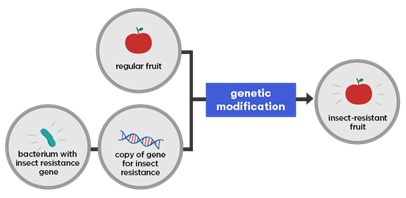-
Q. What are the potential applications of genetic engineering in agriculture, medicine, and environmental conservation? What ethical concerns do these advancements raise? (250 words)
08 May, 2024 GS Paper 3 Science & TechnologyApproach
- Introduce the answer with definition of genetic engineering
- Highlight potential applications of genetic engineering
- Mention ethical concerns related to genetic engineering
- Conclude positively.
Introduction
Genetic engineering is the process of manipulating an organism's genetic material, typically by inserting or deleting specific genes, to achieve desired traits or characteristics. It holds immense promise for agriculture, medicine, and environmental conservation.
Body
Potential Applications of Genetic Engineering:
- Agriculture:
- Reduced Reliance on Pesticides: Engineering pest-resistant crops like Bt cotton minimizes the use of harmful insecticides, safeguarding human health and the environment.
- Enhanced Food Security: Engineering crops resistant to diseases (e.g., Papaya ringspot virus-resistant papaya) reduces crop loss and increases food production, vital for feeding a growing global population.
- China is planting salt-tolerant GM rice in a salty region on the edge of the Xinjiang desert, where most vegetation can't grow to promote food security.
- Improved Nutritional Value: Genetically modified crops can be enriched with essential vitamins and minerals, addressing malnutrition, particularly in developing nations.
- For example, Golden Rice is engineered with increased beta-carotene to combat Vitamin A deficiency.
- Improved Shelf Life: Introducing genes that slow down spoilage can extend the shelf life of fruits and vegetables, reducing food waste and ensuring wider availability of fresh produce.
- Medicine:
- Gene therapy: Genetic engineering can potentially treat or cure genetic disorders by introducing functional genes or correcting defective ones.
- Trails for gene therapy for cystic fibrosis are going on.
- Pharmaceutical production: Genetically engineered bacteria, yeast, or plants can produce therapeutic proteins, vaccines, and antibodies more efficiently.
- For example, yeast can produce human insulin for diabetics, a significant advancement over animal-derived insulin.
- Sickle Cell Disease: Gene editing techniques are being explored to correct the defective gene responsible for sickle cell disease.
- Cancer Treatment: Research is ongoing to use CAR-T cell therapy, where a patient's T cells are genetically modified to recognize and attack cancer cells.
- Gene therapy: Genetic engineering can potentially treat or cure genetic disorders by introducing functional genes or correcting defective ones.
- Environment Conservation:
- Bioremediation: Plants can be genetically modified to absorb pollutants from soil and water, contributing to environmental cleanup efforts.
- Studies are ongoing to explore the use of genetically modified Brassica juncea (Indian mustard) for the bioremediation of soils.
- Microorganisms engineered to metabolize oil can be used to clean up oil spills, minimizing environmental damage.
- Conservation of Endangered Species: Gene banks can store genetic material from endangered species, and genetic engineering techniques may be used to:
- Introduce genes from closely related species to bolster genetic diversity in small, isolated populations of endangered animals.
- Development of Eco-friendly Products: Genetically engineered organisms can produce:
- Biodegradable Plastics: Microbes can be engineered to create biodegradable plastics that decompose naturally, reducing plastic pollution.
- Biofuels: Engineered algae or yeast can be used to produce biofuels as a renewable and sustainable energy source.
- Bioremediation: Plants can be genetically modified to absorb pollutants from soil and water, contributing to environmental cleanup efforts.
Ethical Concerns Related to Genetic Engineering:
- Impact on Biodiversity: Reliance on a few high-yielding GM varieties can reduce agricultural diversity, making crops more vulnerable to widespread diseases like the Irish Potato Famine.
- Human Enhancement: The possibility of using gene editing for non-therapeutic purposes, such as enhancing intelligence or athletic performance, raises ethical questions about creating "designer babies"
- Inequitable Access: The high costs associated with these new technologies could limit access for patients in developing nations, exacerbating existing healthcare disparities.
- Ownership and Control: Genetic engineering raises questions about ownership and control of genetic information, patents on genetically modified organisms, and the commercialization of genetic technologies.
Conclusion
To address these ethical concerns, principles such as beneficence, non-maleficence, autonomy, and justice should guide the development and application of genetic engineering technologies to ensure responsible and equitable use for the greater good of humanity and the environment.
To get PDF version, Please click on "Print PDF" button.
Print PDF





